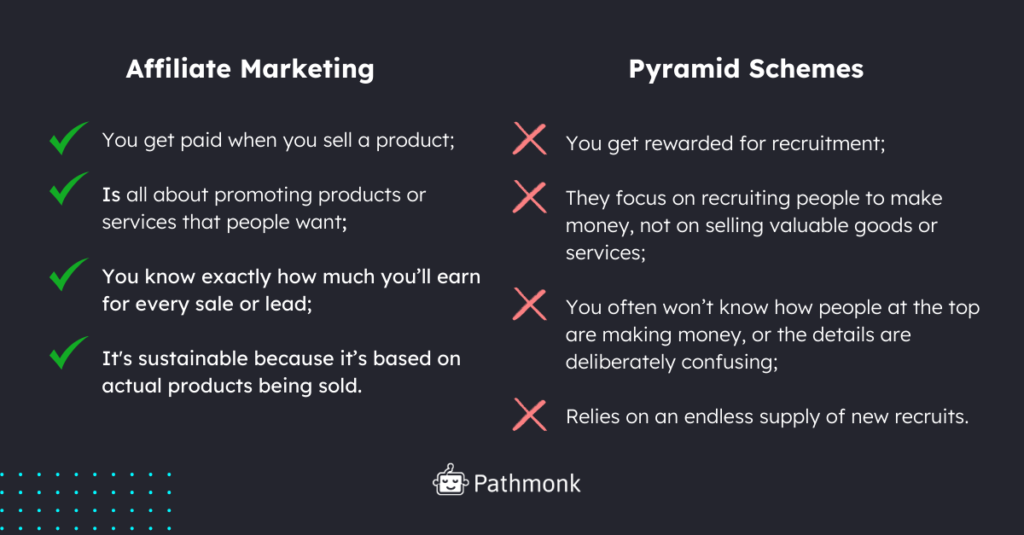
Affiliate marketing. Did you think about doing it at some point but gave up because you got suspicious? All those “Get rich while you sleep!” ads have done a stellar job of making affiliate marketing sound like some modern-day gold rush. It’s understandable. The industry has a reputation problem, thanks in no small part to shady programs and over-the-top claims of overnight wealth.
When people hear about affiliate marketing, it’s not surprising they think of it as nothing more than a pyramid scheme with a digital twist. But, and this is important: affiliate marketing is not a pyramid scheme.
You’re here because you’re trying to understand the real deal and maybe make sure you’re not going to be swindled into some shady, “I promise this is totally legit” operation. The good news? You’re in the right place. In fact, affiliate marketing, when done correctly, is a legitimate, regulated business model that can lead to long-term success.
According to Rakuten, affiliate marketing spending reached $9.1 billion in 2023 in the U.S. alone. This highlights the substantial investment businesses continue to make in affiliate marketing, reinforcing its credibility as a legitimate business model.
Continue in this read as we address the burning question on your mind: how to recognize legit affiliate marketing programs vs. pyramid schemes?
Table of Contents
What is Affiliate Marketing?
Affiliate marketing, in its most basic form, is a commission-based business model. You, as the affiliate, promote products or services from a business. When someone buys through your referral link, you earn a commission. It’s like getting a referral bonus for telling your friend about that new restaurant in town—but on a much bigger scale.
For example, if you’re a blogger or content creator, you might write a review of a product you genuinely like and link to that product using your unique affiliate link. When someone clicks your link, heads over to the business’s website, and buys the product, you get a small cut of that sale. That’s affiliate marketing. No secret handshakes, no membership fees, no need to recruit a hundred other people just to see some money rolling in.
The best part? Affiliate marketing is mutually beneficial for both the business and the affiliate. The business gets more sales, and you, as the affiliate, earn commissions without needing to create products, manage customers, or deal with logistics. Everyone wins.
Now that we’re on the same page about what affiliate marketing is, let’s look at its evil cousin: pyramid schemes.
What is a Pyramid Scheme?
A pyramid scheme is an illegal business model in which participants recruit others into the scheme, promising them hefty returns. But here’s the catch—those returns come from the investments of the new recruits, not from actual sales or value creation.
In a pyramid scheme, money moves from the bottom to the top. The people who get in early might make some money, but those who join later are almost guaranteed to lose out. Why? Because the scheme eventually collapses when there aren’t enough new recruits to sustain the payouts. Since there’s no legitimate product or service being sold, the only way to make money is by bringing in more people. It’s the ultimate “house of cards” business.
Pyramid schemes are illegal in most parts of the world for a reason. They provide no real value to anyone except the few people who get in early. The rest? They’re left holding the bag.
Affiliate Marketing vs. Pyramid Schemes: Key Differences
Alright, let’s tackle the most important part of this conversation. While affiliate marketing and pyramid schemes may look similar to someone standing at a distance, they are entirely different beasts. Let’s break down the key differences:
- Revenue model: In affiliate marketing, you get paid when you sell a product. Plain and simple. You are rewarded based on your ability to bring real sales to the business you’re partnering with. Whether it’s through your blog, social media, or email marketing, the money you make depends on actual sales transactions happening because of your promotional efforts. Pyramid schemes, however, reward you for recruitment. The more people you bring into the scheme, the more money you make. No products are sold, or if there is a product, it’s often just a cover-up for the recruiting focus.
- Product vs. people: Affiliate marketing is all about promoting products or services that people want. Pyramid schemes? Not so much. They focus on recruiting people to make money, not on selling valuable goods or services. In fact, many pyramid schemes have no product at all, or the product is completely irrelevant to the recruitment process.
- Transparency: With affiliate marketing, you know exactly how much you’ll earn for every sale or lead. The payout structure is upfront and clear. Pyramid schemes, on the other hand, are notoriously murky. You often won’t know how people at the top are making money, or the details are deliberately confusing to keep you in the dark.
- Sustainability: Affiliate marketing is sustainable because it’s based on actual products being sold. Businesses will always need people to help market and sell their products. Pyramid schemes, on the other hand, rely on an endless supply of new recruits. And once that pool dries up, the whole thing crumbles.

Common Myths About Affiliate Marketing
Even with all the legitimate evidence pointing to affiliate marketing being a sustainable and profitable business model, myths and misconceptions persist. Let’s debunk some of the most common ones.
Myth 1: Affiliate marketing is just recruiting others This is a big one. No, affiliate marketing is not about recruiting other affiliates to work under you. Unlike pyramid schemes, where recruitment is the main focus, affiliate marketing is about promoting products and services to consumers. You don’t earn money from signing up more affiliates. You earn money by making actual sales.
Myth 2: It’s a get-rich-quick scheme If any TiokToker ever tells you that you’ll make thousands of dollars overnight in affiliate marketing, run. Like any business model, affiliate marketing takes time, effort, and strategy. Yes, you can earn a good income, but it won’t happen overnight. You need to build an audience, create content, and continually refine your approach. It’s like planting a tree—water it, nurture it, and eventually, you’ll see it grow.
Myth 3: Affiliate programs are scams Sure, there are shady programs out there (as there are in any industry), but reputable affiliate programs from companies like Amazon, Shopify, and other major brands are absolutely legitimate. These companies offer clear guidelines on how affiliates earn, and they are fully transparent about their commission structures. Just make sure to do your due diligence before signing up for any affiliate program.

The Legal Side: Is Affiliate Marketing Regulated?
If you’re wondering whether there are laws governing affiliate marketing, the answer is yes. In the United States, for example, the Federal Trade Commission (FTC) has established strict guidelines to ensure transparency in affiliate marketing. Affiliates are required to disclose when they’re promoting a product as part of a paid partnership, meaning that readers or viewers should always know when they’re being marketed to.
Transparency is a huge part of keeping the affiliate marketing industry legitimate, and these laws help build trust between marketers and consumers. Pyramid schemes, by contrast, operate under a veil of secrecy. If an organization isn’t being upfront about how people make money, it’s a massive red flag.
FTC Guidelines for Affiliate Marketers:
- Disclosures must be clear and conspicuous, placed close to the affiliate links.
- Affiliates must avoid making false or misleading claims about the products they promote.
- Any income claims must be truthful and based on actual performance.
Pyramid schemes don’t bother with these types of disclosures because they’re inherently designed to deceive. Affiliate marketing, when done correctly, is aboveboard and follows legal protocols designed to protect both the affiliate and the consumer.
Spotting Red Flags: When a Program Might Be a Pyramid Scheme
If you’re new to affiliate marketing, you might be wondering how to differentiate between a legitimate program and a potential scam. There are several red flags to look out for that can help you steer clear of pyramid schemes.
- Recruitment focus: If the program places a heavy emphasis on recruiting others instead of promoting and selling a product or service, it’s probably a pyramid scheme. Legitimate affiliate programs focus on sales, not recruitment.
- Lack of a real product: Does the program have a real product that people actually want? If not, it’s likely a scam. Pyramid schemes often disguise themselves as “business opportunities” with little or no emphasis on selling tangible goods.
- Exaggerated income claims: “Make $10,000 your first month!” Sound familiar? Promises of easy, fast money are a sure sign of a scam. Real affiliate marketing takes time and effort. If it sounds too good to be true, it probably is.
- Upfront fees: Be wary of any program that asks you to pay a large upfront fee to join. While some legitimate affiliate networks may charge a small fee, pyramid schemes often have exorbitant startup costs without offering any real value in return.
- Unclear compensation plans: If the compensation plan is overly complicated or difficult to understand, that’s another warning sign. Pyramid schemes often use complex compensation structures to confuse participants and hide the fact that they rely on recruitment to generate revenue.
A Legitimate Way to Earn with Affiliate Marketing
Despite the skepticism, affiliate marketing remains a powerful and legitimate way to earn an income online. It offers flexibility, allowing you to work on your own schedule, and the potential for passive income once you’ve set up successful promotional channels.
Unlike pyramid schemes, where the payout structure is based on constant recruitment, affiliate marketing rewards you for your marketing efforts, with no strings attached.
Affiliate marketing also allows you to focus on a niche or industry you’re passionate about. Whether it’s fashion, tech, beauty, or fitness, there’s an affiliate program out there that aligns with your interests. And because it’s based on performance, the more skilled you become at driving traffic and conversions, the more you can earn.
Increase Conversions from Your Affiliate Campaigns
Let’s be real, the affiliate marketing world is getting more and more crowded, whereas new joiners have to step up their game to have real gains. That doesn’t mean investing more, but rather being smart and taking advantage of every visitor acquired from your social campaigns: from the moment they arrive until after they leave your website -or, even better, make a purchase from your affiliate links.
To get more conversions from your affiliate traffic, Pathmonk is your ideal partner. It will show a dynamic website experience on your page to match your visitors’ intention, increasing their chances of conversion by around 50% on average, with some websites seeing improvements of over 2x and 3x their usual conversion rates.
Try out this interactive demo and see it for yourself!
Increase +180% conversions from your website with AI
Get more conversions from your existing traffic by delivering personalized experiences in real time.
- Adapt your website to each visitor’s intent automatically
- Increase conversions without redesigns or dev work
- Turn anonymous traffic into revenue at scale


